-
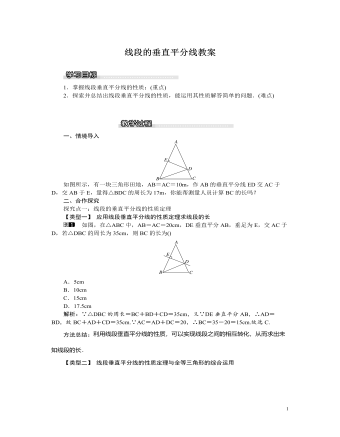
北师大初中八年级数学下册线段的垂直平分线教案
∵∠DAE=∠DAF,∠AED=∠AFD,AD=AD,∴△ADE≌△ADF,∴AE=AF,DE=DF,∴直线AD垂直平分线段EF.方法总结:当一条直线上有两点都在同一线段的垂直平分线上时,这条直线就是该线段的垂直平分线,解题时常需利用此性质进行线段相等关系的转化.三、板书设计1.线段的垂直平分线的性质定理线段垂直平分线上的点到这条线段两个端点的距离相等.2.线段的垂直平分线的判定定理到一条线段两个端点距离相等的点,在这条线段的垂直平分线上.本节课由于采用了直观操作以及讨论交流等教学方法,从而有效地增强了学生的感性认识,提高了学生对新知识的理解与感悟,因此本节课的教学效果较好,学生对所学的新知识掌握较好,达到了教学的目的.不足之处是少数学生对线段垂直平分线性质定理的逆定理理解不透彻,还需在今后的教学和作业中进一步进行巩固和提高.
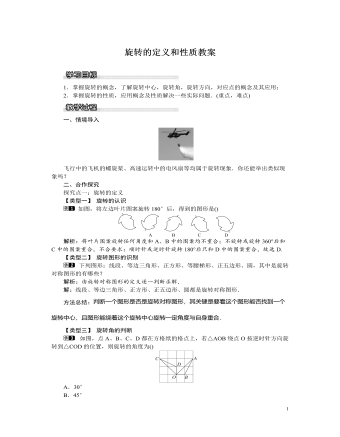
北师大初中八年级数学下册旋转的定义和性质教案
(3)∵AD=4,DE=1,∴AE=42+12=17.∵对应点到旋转中心的距离相等且F是E的对应点,∴AF=AE=17.(4)∵∠EAF=90°(旋转角相等)且AF=AE,∴△EAF是等腰直角三角形.【类型二】 旋转的性质的运用如图,点E是正方形ABCD内一点,连接AE、BE、CE,将△ABE绕点B顺时针旋转90°到△CBE′的位置.若AE=1,BE=2,CE=3则∠BE′C=________度.解析:连接EE′,由旋转性质知BE=BE′,∠EBE′=90°,∴△BEE′为等腰直角三角形且∠EE′B=45°,EE′=22.在△EE′C中,EE′=22,E′C=1,EC=3,由勾股定理逆定理可知∠EE′C=90°,∴∠BE′C=∠BE′E+∠EE′C=135°.三、板书设计1.旋转的概念将一个图形绕一个顶点按照某个方向转动一个角度,这样的图形运动称为旋转.2.旋转的性质一个图形和它经过旋转所得的图形中,对应点到旋转中心的距离相等,任意一组对应点与旋转中心的连线所成的角都等于旋转角,对应线段相等,对应角相等.
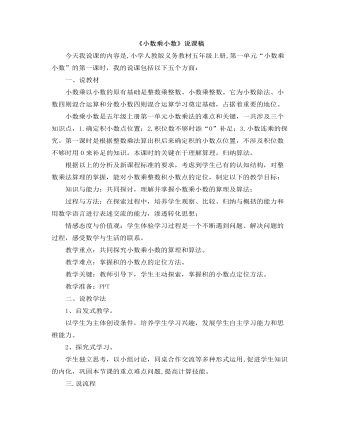
小学数学人教版五年级上册《小数乘小数》说课稿
一、说教材小数乘以小数的原有基础是整数乘整数、小数乘整数。它为小数除法、小数四则混合运算和分数小数四则混合运算学习奠定基础,占据着重要的地位。小数乘小数是五年级上册第一单元小数乘法的难点和关键,一共涉及三个知识点,1.确定积小数点位置;2.积位数不够时添“0”补足;3.小数连乘的探究。第一课时是根据整数乘法算出积后来确定积的小数点位置,不涉及积位数不够时用0来补足的知识。本课时的关键在于理解算理,归纳算法。根据以上的分析及新课程标准的要求,考虑到学生已有的认知结构,对整数乘法算理的掌握,能对小数乘整数积小数点的定位,制定以下的教学目标:知识与能力:共同探讨,理解并掌握小数乘小数的算理及算法;过程与方法:在探索过程中,培养学生观察、比较、归纳与概括的能力和用数学语言进行表述交流的能力,渗透转化思想;
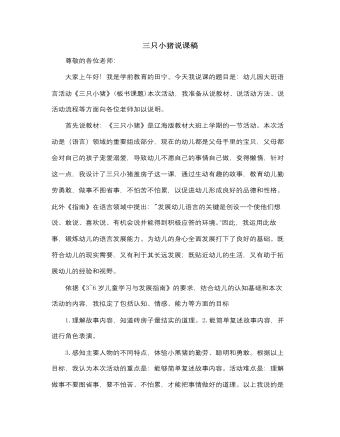
人音版小学音乐二年级下册三只小猪说课稿
第四环节:播放视频《三只小猪》。增加幼儿对故事的印象,并讨论:你们觉得故事中的小黑猪是怎么样一只小猪?(是一只勤劳、勇敢、聪明的小猪)如果你盖房子,会选择什么材料盖?建议幼儿盖结实的砖房子,要做一个不怕苦、不怕累的孩子。第五环节:表演《三只小猪》。选出扮演角色,分发头饰。运用多媒体课件布置故事背景,教师指导。最后教师再围绕活动重点和活动方法进行最后的归纳和总结。在归纳总结的基础上,我又设计了活动延伸:小朋友们真棒!今天都学会了讲这个故事。那晚上回家的时候就唱给爸爸妈妈听一听哦。请爸爸妈妈监督我们做一个勤劳、勇敢的孩子!各位老师:俗话说“教无定法,贵在得法”,能使一个活动取得成功,需要不断地尝试和探索,我会在以后的教学实践中,在新的教育理念的熏陶下,和孩子们一起探索,一起成长。望各位老师给予批评指正。
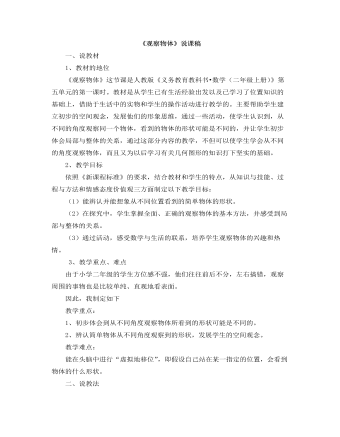
小学数学人教版二年级上册《观察物体》说课稿
1、教材的地位《观察物体》这节课是人教版《义务教育教科书?数学(二年级上册)》第五单元的第一课时。教材是从学生已有生活经验出发以及已学习了位置知识的基础上,借助于生活中的实物和学生的操作活动进行教学的。主要帮助学生建立初步的空间观念,发展他们的形象思维,通过一些活动,使学生认识到,从不同的角度观察同一个物体,看到的物体的形状可能是不同的,并让学生初步体会局部与整体的关系,通过这部分内容的教学,不但可以使学生学会从不同的角度观察物体,而且又为以后学习有关几何图形的知识打下坚实的基础。 2、教学目标依照《新课程标准》的要求,结合教材和学生的特点,从知识与技能、过程与方法和情感态度价值观三方面制定以下教学目标:(1)能辨认并能想象从不同位置看到的简单物体的形状。 (2)在探究中,学生掌握全面、正确的观察物体的基本方法,并感受到局部与整体的关系。 (3)通过活动,感受数学与生活的联系,培养学生观察物体的兴趣和热情。3、教学重点、难点由于小学二年级的学生方位感不强,他们往往前后不分,左右搞错,观察周围的事物也是比较单纯、直观地看表面。
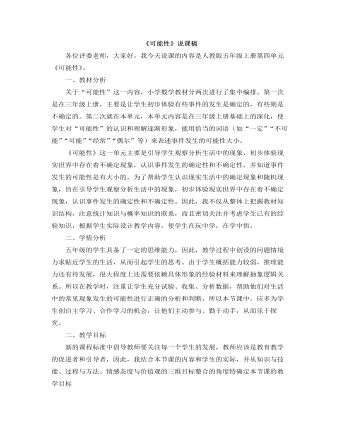
小学数学人教版五年级上册《可能性》说课稿
二、学情分析五年级的学生具备了一定的思维能力,因此,教学过程中创设的问题情境力求贴近学生的生活,从而引起学生的思考。由于学生概括能力较弱,推理能力还有待发展,很大程度上还需要依赖具体形象的经验材料来理解抽象逻辑关系。所以在教学时,注重让学生充分试验、收集、分析数据,帮助他们对生活中的常见现象发生的可能性进行正确的分析和判断,所以本节课中,应多为学生创自主学习、合作学习的机会,让他们主动参与、勤于动手,从而乐于探究。二、教学目标新的课程标准中倡导教师要关注每一个学生的发展,教师应该是教育教学的促进者和引导者,因此,我结合本节课的内容和学生的实际,并从知识与技能、过程与方法、情感态度与价值观的三维目标整合的角度特确定本节课的教学目标 1.通过试验操作,懂得有些事情的发生是确定的,有些则是不确定的,并用“一定”“不可能”“可能”等词语来描述知道事情发生的可能性是有大有小的,且可能性的大小与物体数量有关。2.经历猜测、试验、收集与分析试验结果等过程。 3培养学生的随机观念以及培养学生判断、推理和合作探究的能力。
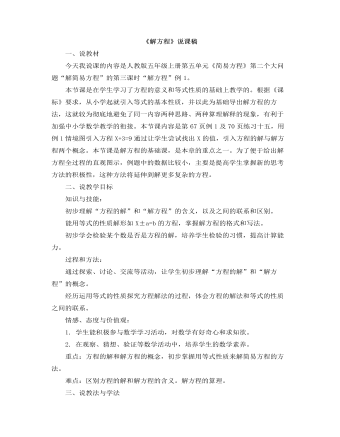
小学数学人教版五年级上册《解方程》说课稿
二、说教学目标知识与技能:初步理解“方程的解”和“解方程”的含义,以及之间的联系和区别。能用等式的性质解形如X±a=b的方程,掌握解方程的格式和写法。初步学会检验某个数是否是方程的解,培养学生检验的习惯,提高计算能力。过程和方法:通过探索、讨论、交流等活动,让学生初步理解“方程的解”和“解方程”的概念。经历运用等式的性质探究方程解法的过程,体会方程的解法和等式的性质之间的联系。情感、态度与价值观:1. 学生能积极参与数学学习活动,对数学有好奇心和求知欲。2. 在观察、猜想、验证等数学活动中,培养学生的数学素养。重点:方程的解和解方程的概念,初步掌握用等式性质来解简易方程的方法。难点:区别方程的解和解方程的含义。解方程的算理。三、说教法与学法教法:新课标指出,教师是学习的组织者、引导者、合作者,充分发挥学生的主体性。根据这一理念,我在教学中通过观察、猜想、验证等方式,自主探索、自主学习。有目的地运用知识迁移的规律,引导学生进行观察、比较、分析、概括,培养学生的逻辑思维能力。学法:①让学生学会以旧引新,掌握并运用知识迁移进行学习的方法;②让学生学会自主发现问题,分析问题,解决问题的方法。
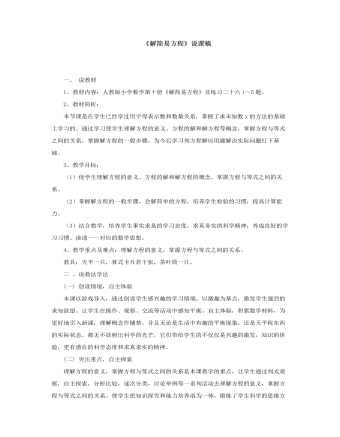
小学数学人教版五年级上册解简易方程说课稿
一、 说教材1、教材内容:人教版小学数学第十册《解简易方程》及练习二十六1~5题。2、教材简析:本节课是在学生已经学过用字母表示数和数量关系,掌握了求未知数x的方法的基础上学习的。通过学习使学生理解方程的意义、方程的解和解方程等概念,掌握方程与等式之间的关系,掌握解方程的一般步骤,为今后学习列方程解应用题解决实际问题打下基础。3、教学目标:(1)使学生理解方程的意义、方程的解和解方程的概念,掌握方程与等式之间的关系。(2)掌握解方程的一般步骤,会解简单的方程,培养学生检验的习惯,提高计算能力。(3)结合教学,培养学生事实求是的学习态度,求真务实的科学精神,养成良好的学习习惯。渗透一一对应的数学思想。
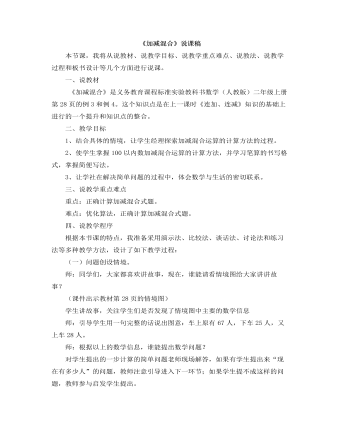
小学数学人教版二年级上册《加减混合》说课稿
一、说教材《加减混合》是义务教育课程标准实验教科书数学(人教版)二年级上册第28页的例3和例4。这个知识点是在上一课时《连加、连减》知识的基础上进行的一个提升和知识点的整合。二、教学目标 1、结合具体的情境,让学生经理探索加减混合运算的计算方法的过程。 2、使学生掌握100以内数加减混合运算的计算方法,并学习笔算的书写格式,掌握简便写法。 3、让学社在解决简单问题的过程中,体会数学与生活的密切联系。三、说教学重点难点重点:正确计算加减混合式题。 难点:优化算法,正确计算加减混合式题。 四、说教学程序 根据本节课的特点,我准备采用演示法、比较法、谈话法、讨论法和练习法等多种教学方法,设计了如下教学过程:
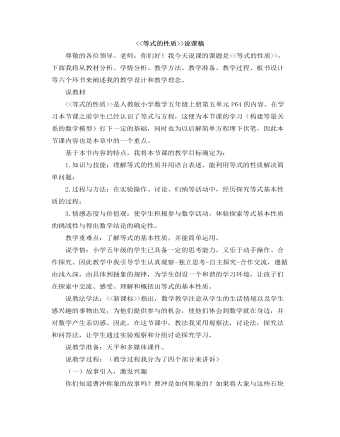
小学数学人教版五年级上册《等式的性质》说课稿
说教材>是人教版小学数学五年级上册第五单元P64的内容。在学习本节课之前学生已经认识了等式与方程,这便为本节课的学习(构建等量关系的数学模型)打下一定的基础,同时也为以后解简单方程埋下伏笔,因此本节课内容也是本章中的一个重点。基于本节内容的特点,我将本节课的教学目标确定为:1.知识与技能:理解等式的性质并用语言表述,能利用等式的性质解决简单问题;2.过程与方法:在实验操作、讨论、归纳等活动中,经历探究等式基本性质的过程;3.情感态度与价值观:使学生积极参与数学活动,体验探索等式基本性质的挑战性与得出数学结论的确定性。教学重难点:了解等式的基本性质,并能简单运用。说学情:小学五年级的学生已具备一定的思考能力,又乐于动手操作、合作探究。因此教学中我引导学生认真观察-独立思考-自主探究-合作交流,遵循由浅入深,由具体到抽象的规律,为学生创设一个和谐的学习环境,让孩子们在探索中交流、感受、理解和概括出等式的基本性质。
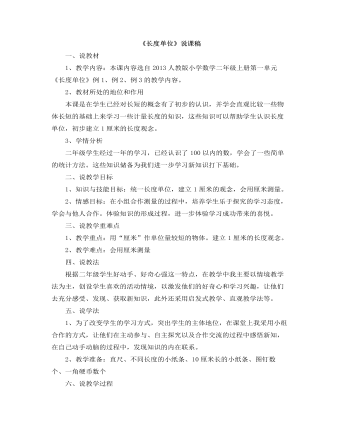
小学数学人教版二年级上册《长度单位》说课稿
一、说教材1、教学内容:本课内容选自2013人教版小学数学二年级上册第一单元《长度单位》例1、例2、例3的教学内容。 2、教材所处的地位和作用本课是在学生已经对长短的概念有了初步的认识,并学会直观比较一些物体长短的基础上来学习一些计量长度的知识,这些知识可以帮助学生认识长度单位,初步建立1厘米的长度观念。 3、学情分析二年级学生经过一年的学习,已经认识了100以内的数,学会了一些简单的统计方法。这些知识储备为我们进一步学习新知识打下基础。二、说教学目标1、知识与技能目标:统一长度单位,建立1厘米的观念,会用厘米测量。2、情感目标:在小组合作测量的过程中,培养学生乐于探究的学习态度,学会与他人合作。体验知识的形成过程,进一步体验学习成功带来的喜悦。
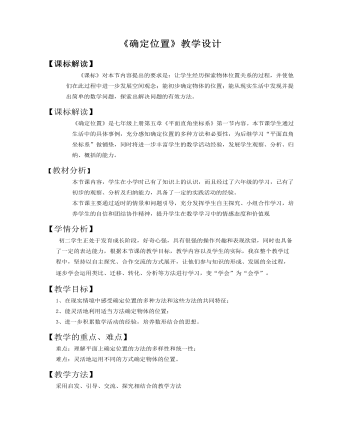
初中数学鲁教版七年级上册《第五章 位置与坐标 1 确定位置》教学设计教案
1、通过同位之间互说座位位置,检测知识目标2、3的达成效果。2、通过导学案上的探究一,检测知识目标2、3的达成效果。 3、通过探究二,检测知识目标1、3的达成效果。 4、通过课堂反馈,检测总体教学目标的达成效果。本节课遵循分层施教的原则,以适应不同学生的发展与提高,针对学生回答问题本着多鼓励、少批评的原则,具体从以下几方面进行评价:1、通过学生独立思考、参与小组交流和班级集体展示,教师课堂观察学生的表现,了解学生对知识的理解和掌握情况。教师进行适时的反应评价,同时促进学生的自评与互评。2、通过设计课堂互说座位、探究一、二及达标检测题,检测学习目标达成情况,同时有利于学生完成对自己的评价。3.通过课后作业,了解学生对本课时知识的掌握情况,同时又能检测学生分析解决问题的方法和思路,完成教学反馈评价。

九年级上册道德与法治文明与家园2作业设计
6.家书,蕴含着家风、家训、家教,也承载着社会记忆和文化传承,为此,阜阳市第 十七中学开展了“一封家书致父母”主题活动。开展这一活动 ( )A. 旨在引导学生传承传统美德 B.表明文明因交流而丰富多彩C.是全面继承传统文化的体现 D.显示了中华文化是最优秀的7.2021年7月25日,我国世界遗产提名项目“泉州:宋元中国的世界海洋商贸中心”顺 利通过联合国教科文组织第44届世界遗产委员会会议审议,成功列入《世界遗产名 录》。至此,我国世界遗产总数升至56项。“泉州:宋元中国的世界海洋商贸中心” 成功申遗( )A.体现了中华优秀传统文化是世界上最优秀的文化B.说明了传统文化是一个国家兴旺发达的不竭源泉C.是保护和传承中华优秀传统文化的最佳途径D.能够进一步增强中国人民的自豪感,坚定文化自信8.三星堆遗址新发现6座“祭祀坑”,现己出土重要文物500余件。
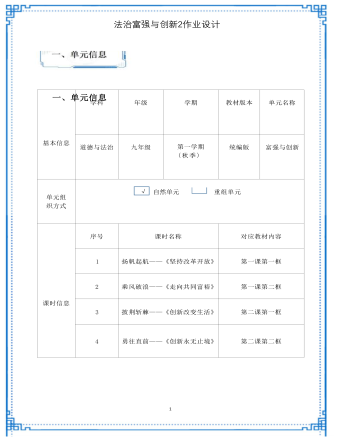
九年级上册道德与法治富强与创新2作业设计
【作业分析】本题考查创新改变生活。防雨神器自动收晾衣服的灵感来源是下 雨忘记收衣服被批评,体现创新是来源于生活、来源于实践。“智能晴雨棚”打 破了传统的只能晾衣服的常规。而由教材内容可知,创新是改革开放的生命, 改革在不断创新中提升发展品质,所以②错误;故本题选 C2. (改编) 利用“安康码”自动定位,即可监测附近新冠肺炎感染病例发病点; 通过输入自己的手机号码,即可通过“通信大数据卡”判断自己是否到访过高 危地区;通过皖事通 APP“密接人员自查”即可查询自己是否曾与新冠肺炎感染 患者接触……疫情发生以来,大数据、健康码、无人机、机器人、测温仪等众 多科技创新成果纷纷登场,助力疫情防控,提高了抗击疫情的精准化水平。这 表明 ( )①标志着我国已经成为科技强国②实施创新驱动发展战略成效显著③创新应成为国家发展进步的中心工作④创新的目的是增进人类福祉,让生活更美好A.①② B.②③ C.①④ D.②④【评价实施主体】教师【评价标准】D【作业分析】本题考查科技创新改变生活中创新的重要性。我国现在还不是科 技强国,但科技自主创新能力不断增强,所以①说法错误。

人教A版高中数学必修一对数的运算教学设计(1)
本节课是新版教材人教A版普通高中课程标准实验教科书数学必修1第四章第4.3.2节《对数的运算》。其核心是弄清楚对数的定义,掌握对数的运算性质,理解它的关键就是通过实例使学生认识对数式与指数式的关系,分析得出对数的概念及对数式与指数式的 互化,通过实例推导对数的运算性质。由于它还与后续很多内容,比如对数函数及其性质,这也是高考必考内容之一,所以在本学科有着很重要的地位。解决重点的关键是抓住对数的概念、并让学生掌握对数式与指数式的互化;通过实例推导对数的运算性质,让学生准确地运用对数运算性质进行运算,学会运用换底公式。培养学生数学运算、数学抽象、逻辑推理和数学建模的核心素养。1、理解对数的概念,能进行指数式与对数式的互化;2、了解常用对数与自然对数的意义,理解对数恒等式并能运用于有关对数计算。

人教A版高中数学必修一诱导公式教学设计(1)
一、复习回顾,温故知新1. 任意角三角函数的定义【答案】设角 它的终边与单位圆交于点 。那么(1) (2) 2.诱导公式一 ,其中, 。终边相同的角的同一三角函数值相等二、探索新知思考1:(1).终边相同的角的同一三角函数值有什么关系?【答案】相等(2).角 -α与α的终边 有何位置关系?【答案】终边关于x轴对称(3).角 与α的终边 有何位置关系?【答案】终边关于y轴对称(4).角 与α的终边 有何位置关系?【答案】终边关于原点对称思考2: 已知任意角α的终边与单位圆相交于点P(x, y),请同学们思考回答点P关于原点、x轴、y轴对称的三个点的坐标是什么?【答案】点P(x, y)关于原点对称点P1(-x, -y)点P(x, y)关于x轴对称点P2(x, -y) 点P(x, y)关于y轴对称点P3(-x, y)

人教A版高中数学必修一任意角教学设计(1)
本节课选自《普通高中课程标准数学教科书-必修一》(人 教A版)第五章《三角函数》,本节课是第1课时,本节主要介绍推广角的概念,引入正角、负角、零角的定义,象限角的概念以及终边相同的角的表示法。树立运动变化的观点,并由此进一步理解推广后的角的概念。教学方法可以选用讨论法,通过实际问题,如时针与分针、体操等等都能形成角的流念,给学生以直观的印象,形成正角、负角、零角的概念,明确规定角的概念,通过具体问题让学生从不同角度理解终边相同的角,从特殊到一般归纳出终边相同的角的表示方法。A.了解任意角的概念;B.掌握正角、负角、零角及象限角的定义,理解任意角的概念;C.掌握终边相同的角的表示方法;D.会判断角所在的象限。 1.数学抽象:角的概念;2.逻辑推理:象限角的表示;3.数学运算:判断角所在象限;4.直观想象:从特殊到一般的数学思想方法;

人教A版高中数学必修二简单随机抽样教学设计
知识探究(一):普查与抽查像人口普查这样,对每一个调查调查对象都进行调查的方法,称为全面调查(又称普查)。 在一个调查中,我们把调查对象的全体称为总体,组成总体的每一个调查对象称为个体。为了强调调查目的,也可以把调查对象的某些指标的全体作为总体,每一个调查对象的相应指标作为个体。问题二:除了普查,还有其他的调查方法吗?由于人口普查需要花费巨大的财力、物力,因而不宜经常进行。为了及时掌握全国人口变动状况,我国每年还会进行一次人口变动情况的调查,根据抽取的居民情况来推断总体的人口变动情况。像这样,根据一定目的,从总体中抽取一部分个体进行调查,并以此为依据对总体的情况作出估计和判断的方法,称为抽样调查(或称抽查)。我们把从总体中抽取的那部分个体称为样本,样本中包含的个体数称为样本量。
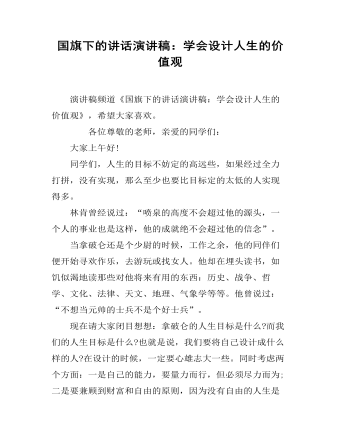
国旗下的讲话演讲稿:学会设计人生的价值观
演讲稿频道《国旗下的讲话演讲稿:学会设计人生的价值观》,希望大家喜欢。各位尊敬的老师,亲爱的同学们:大家上午好!同学们,人生的目标不妨定的高远些,如果经过全力打拼,没有实现,那么至少也要比目标定的太低的人实现得多。林肯曾经说过:“喷泉的高度不会超过他的源头,一个人的事业也是这样,他的成就绝不会超过他的信念”。当拿破仑还是个少尉的时候,工作之余,他的同伴们便开始寻欢作乐,去游玩或找女人。他却在埋头读书,如饥似渴地读那些对他将来有用的东西:历史、战争、哲学、文化、法律、天文、地理、气象学等等。他曾说过:“不想当元帅的士兵不是个好士兵”。
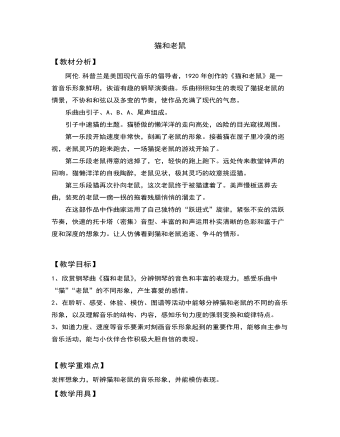
二年级音乐欣赏猫和老鼠教案教学设计
阿伦.科普兰是美国现代音乐的倡导者,1920年创作的《猫和老鼠》是一首音乐形象鲜明,诙谐有趣的钢琴演奏曲。乐曲栩栩如生的表现了猫捉老鼠的情景,不协和和弦以及多变的节奏,使作品充满了现代的气息。乐曲由引子、A、B、A、尾声组成。引子中速猫的主题。猫骄傲的懒洋洋的走向高处,凶险的目光窥视周围。第一乐段开始速度非常快,刻画了老鼠的形象。接着猫在屋子里冷漠的巡视,老鼠灵巧的跑来跑去,一场猫捉老鼠的游戏开始了。第二乐段老鼠得意的逃掉了,它,轻快的跑上跑下。远处传来教堂钟声的回响。猫懒洋洋的自我陶醉,老鼠见状,极其灵巧的故意挑逗猫。第三乐段猫再次扑向老鼠,这次老鼠终于被猫逮着了。美声慢板送葬去曲,装死的老鼠一瘸一拐的拖着残腿悄悄的溜走了。在这部作品中作曲家运用了自己独特的“跃进式”旋律,紧张不安的活跃节奏,快速的托卡塔(密集)音型、丰富的和声运用朴实清晰的色彩和富于广度和深度的想象力。让人仿佛看到猫和老鼠追逐、争斗的情形。



